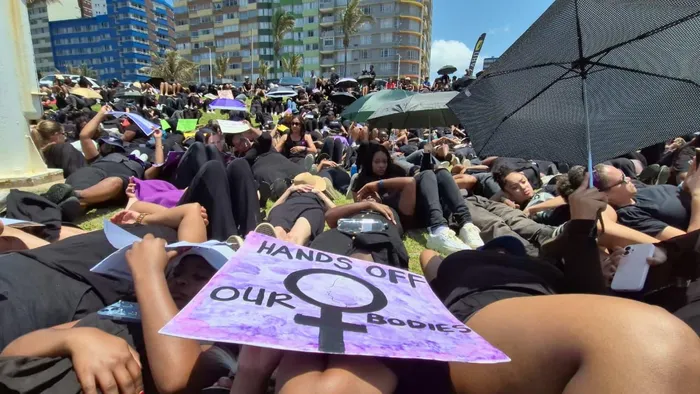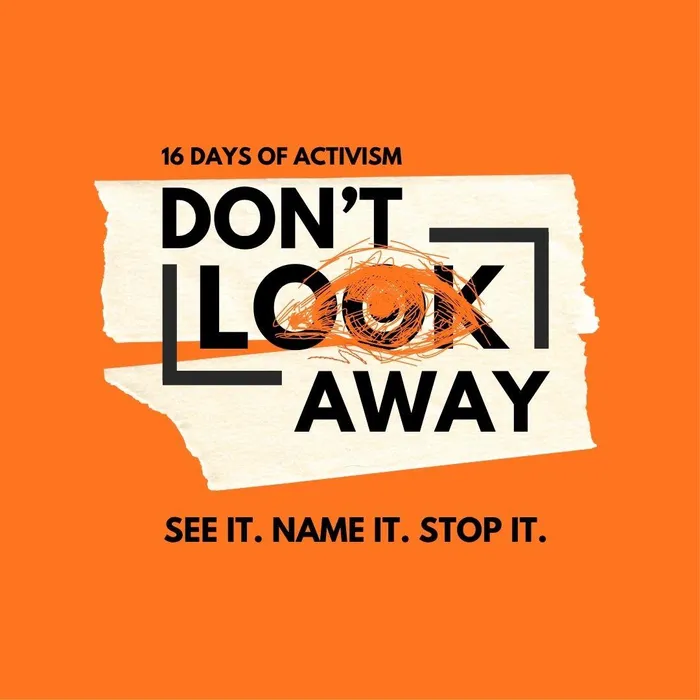Action needed on GBVF after national disaster declaration

Thousands of voices across the country joined Women For Change in a powerful protest, demanding action and accountability as gender-based violence and femicide was declared a national disaster in South Africa. Hundreds gathered at Durban's South Beach, dressed in black, and lay down for 15 minutes of silent protest on Friday.
Image: Sibonelo Ngcobo / Independent Media
The declaration of gender-based violence and femicide (GBVF) as a National Disaster under the Disaster Management Act, 2002, has received mixed reactions from key stakeholders.
They stress that this significant legislative step must be followed by tangible action, accountability, and sustained political will to avoid becoming another hollow promise.
This follows a successful national campaign by Women For Change, backed by a petition with over 1.1 million signatures, calling for GBVF to be declared a National Disaster.
The campaign culminated in a country-wide shutdown on Friday, where thousands of South Africans silently protested.
Social Development Minister Nokuzola Sisisi Tolashe welcomed the decision, stating that it reflects the gravity of the crisis and reinforces the need for urgent, coordinated, and sustained action across the country.
“This decision confirms that GBVF is not a private or isolated matter but a national emergency that requires urgent and united action,” she said.
GBVF affects all sectors of society, including women, children, persons with disabilities, and members of the LGBTQIA+ community, making strong coordination and effective monitoring essential.
“The Department of Social Development views this decision as an important reinforcement of its work to protect the most vulnerable. The classification enables the department to expand survivor support through shelters, safe spaces, counselling services, and community-based prevention programmes,” Tolashe added.
She noted that the declaration improves coordination with criminal justice, health, policing, and education sectors so that survivors receive timely assistance.
“The decision enhances national capacity for monitoring and reporting, ensuring that community organisations and partners remain aligned to the disaster management framework,” she stated.
Sonke Gender Justice co-executive director, Bafana Khumalo, cautiously welcomed the declaration, calling it an important landmark in the quest to turn the tide against GBVF.
Khumalo highlighted that civil society had lobbied for a comprehensive GBVF response for years, leading to two national summits convened by the president and the development of the National Strategic Plan on GBVF.
However, he noted that the plan lacked coherent implementation, particularly regarding funding from corporate resources and the UK government.
“It took civil society, once more led by women, to push the government to consider declaring GBVF as a national disaster,” Khumalo stated.
He explained that such a declaration provides a legal framework for the state to coherently and coordinately unlock resources to tackle GBVF comprehensively.
Khumalo stressed that more work is needed to ensure that regulations address all critical GBVF-related challenges.
“We look forward to meaningful engagement with the responsible ministry... to ensure that this is not yet another promise that will remain hollow. Women and girls of South Africa deserve better,” he concluded.
TEARS Foundation General Manager of Operations, Celeste Louw, congratulated Women for Change on their successful campaign to have GBVF declared a National Disaster.
However, Louw expressed concern that the government's response falls short of accountability and practical implementation of the processes and commitments promised since the president declared GBVF a national emergency in 2020.
“As TEARS Foundation, we ask what this means for survivors on the ground?”
RISE Mzansi fully endorses the declaration, stating that this significant legislative move must ensure existing safeguards are enforced and strengthened so every woman, child, and the LGBTQIA+ community can live free from fear.
Where violence is perpetuated, there must be confidence that the criminal justice system will act accordingly.
Party spokesperson Mabine Seabe said this crisis requires a holistic approach, beyond just safety.
This includes policies targeting jobs, substance abuse, and socio-economic conditions, areas where the National Disaster Declaration must play a part.
However, Seabe stressed that the primary driver of this epidemic is the perpetrators' lack of fear of consequences, which “must stop”.
The party stated that the National Disaster declaration must mandate quarterly reporting: the NPA on GBVF caseloads and prosecution rates, SAPS on GBVF dockets and cases (especially rape), and Stats SA on the female unemployment rate.
The Commission for Gender Equality also needs resources to fully execute its gender equality mandate, including monitoring, investigating, educating, and advising, it added.
Furthermore, Parliament must receive a report from the Executive and its agencies on the impact of the National Disaster.
“Much credit must be given to the women of South Africa, Women for Change, and other civil society organisations who have gotten us to this point. A year from now, we must have made progress; if not, the declaration of the National Disaster would have been in name alone. Now more than ever, political will is necessary,” Seabe said.
Ilitha Labantu, an anti-GBV organisation, has repeatedly made public declarations that are a recurring feature in the national discourse, even under the current administration.
Despite this, spokesperson Siyabulela Monakali noted that these commitments have failed to translate into sustained implementation or meaningful impact for the people most affected.
“To classify GBVF as a health crisis without addressing the structural and institutional conditions that enable its continuation risks reinforcing a cycle of symbolic recognition without transformation,” Monakali said.
He explained that despite legal frameworks intended to safeguard women's rights, implementation and enforcement failures remain stark.
“Survivors continue to face fragmented services, delayed justice, and inadequate support from state institutions. The result is a deeply entrenched culture of impunity, where violence is normalised and accountability remains elusive,” he added.
Monakali stated that this moment must signal a decisive shift from episodic dialogue and symbolic gestures towards comprehensive, adequately resourced, survivor-centred interventions.
He emphasised that such an approach requires a coordinated, multi-sector response integrating prevention, psychosocial support, healthcare, justice, and community-based protection strategies.
“Central to this is the need for clear accountability mechanisms, sustainable funding for frontline support services, and the implementation of evidence-based programmes that address the root causes of violence,” Monakali concluded.
He warned that South Africa cannot afford a repeat of patterns where outrage is expressed yet systemic failures remain unchanged.
“The gravity of this declaration must be matched with measurable action, backed by political will and sustained commitment. Anything less will continue to undermine the safety, dignity, and wellbeing of women, children, and vulnerable persons in South Africa.”
karen.singh@inl.co.za

Miss Petite Universe finalist Prisha Naidoo stands firm in her commitment to support survivors of gender-based violence and femicide.
Image: Sibonelo Ngcobo / Independent Media

Stand up against gender-based violence and femicide in South Africa. It's time to confront the harsh realities and take action. Together, we can create a safer future for all. Every voice matters — let's be heard!
Image: Independent Media